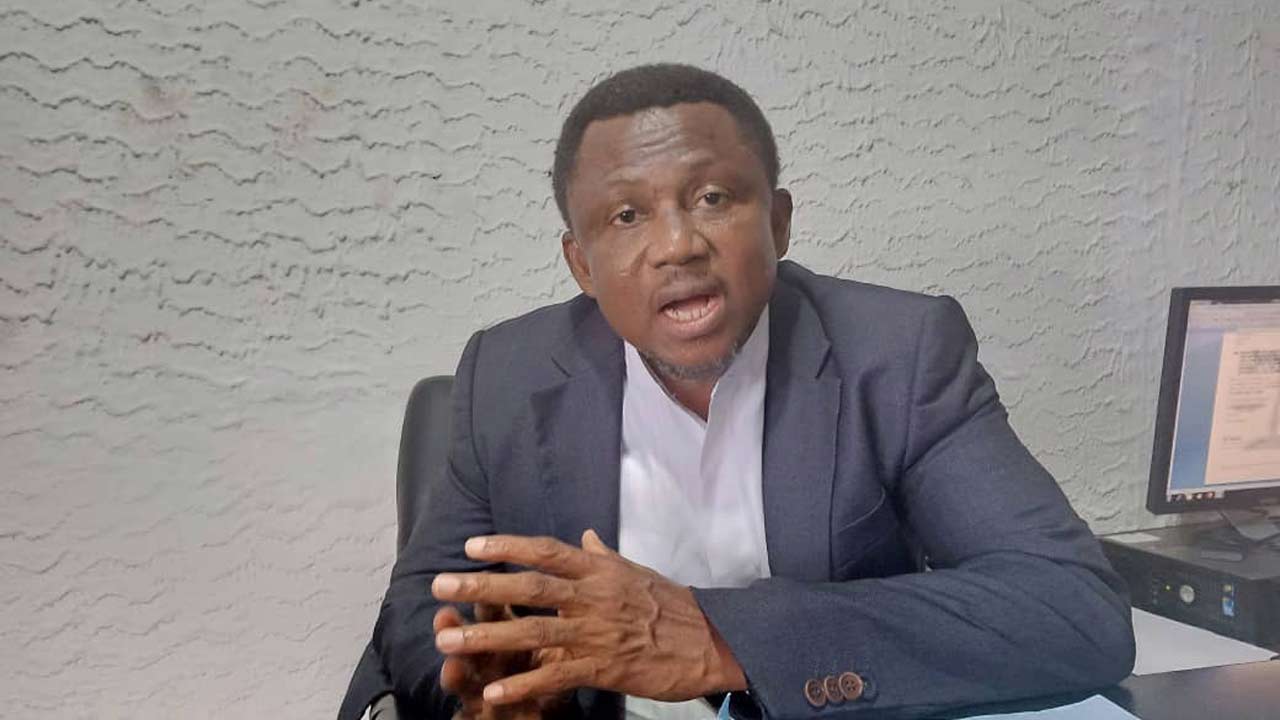Mr. Lawrence Nwakaeti is an Imo State based legal practitioner and human rights activist. He is former Chairman, Nigeria Bar Association (NBA), Owerri branch. He was also a member, National Executive Council and Human Rights Commission of the NBA. In this interview with COLLINS OSUJI, he speaks on Nigerian judicial system, the recent banning of the Special Anti-Robbery Squad, (SARS), among others.
Nigeria just marked her 60th independence. In your opinion, what areas do you think need to be improved in our judicial system?
He, who pays the piper, calls the tune. This particular aphorism is true when it comes to master – servant relationship. The master always issues directives, while the servant is there to carry out the directives. I wouldn’t want to say it applies to the relationship between the judiciary and the other arms of government, but in a way when the judiciary always move cap-in-hand asking for fund from the executive, there is that feeling of dependence in the psyche of an average judicial officer. For their vehicles to be changed, the executive must approve it. For them to get appointed, the executive must approve it. For them to have facilities to work effectively, the executive must approve it.
Those are not good for the judiciary. I think it is high time we looked into the financial autonomy of the judiciary. At the end of any fiscal year, whatever is the need of the judicial arm of government should be articulated and forwarded to form part of the budget of the nation so that at the point of passage, once funds are released, these funds should be transferred as first line charge. That is what the Constitution says. And the moment they get this fund, they use it, as the needs arise instead of the executive keeping these funds as a father keeps the money belonging to his small child. The judiciary, which is an equal partner in the business of governance should be able to access its funds on time and use it as it deemed fit. What I am saying is that there is a very big gap or disparity in the way the executive, the legislature and the judiciary access their funds. The executive accesses funds, as it wants. The same applies to the legislature but it does not apply to the judiciary. So the moment that financial autonomy is practicalised, I think it will be better. And this is the right time to do that.
Still on the 60th independence, what do you think is the way forward for Nigeria?
We are still in infancy stage even though we are 60. The military did a lot of damage to Nigeria. It was military adventurism, which moved from one junta to the other. At a point, it became a fashion. And upon leaving office, they bequeathed on us a fraud called the 1999 Constitution. Why did I say it is a fraud? The opening line says, “we the people of Nigeria give unto ourselves the following constitution.” When did we meet to do that? Who are the we? When something is founded on fraud, it diminishes its benefit because you can’t place something on nothing and expect it to stand.
A couple that derived the name from “Nigga Area”, meaning area occupied by Negros, derogatorily named the country. Some think it is “Niger Area”. Even at that, the name Niger relates to the same Nigga. And the people that made up the entity have nothing in common. They were forced together without their consent. None of their ancestors, none of their leadership ever signed the amalgamation document because I know that as at 1914 when Nigeria came to be, Zik was 10 years and Awolowo was five. Zik was born in 1904, while Awolowo was born in 1909. Sir Ahmadu Bello, the late Premier of the defunct Northern region was younger. So you now asked, who signed it for us? So Lord Lugard by fiat joined disparate people together. Now, when they realised the diverse nature of this country, they decided to adopt a system through several constitutional conferences. You have the 1942 Richard’s constitution; you have the Macpherson and so many others.
I may not quote the dates offhand. Even the Willink’s commission that gave birth to Richards’ constitution looked into the rights of the minorities to assuage their fears, by proposing a regional system of government where each region will be autonomous. Then it came up with three regions, the North, the West and the East. The Midwestern region was carved out of the Western region in 1963. Now, each of these regions was autonomous. They had their own constitution, police, judicial service and civil service. They had everything except defence, currency, and few other duties that were prerogative of the national body. Every other duty devolved to the regions. And they were self-sustaining. You pay taxes to the Federal government, or the government at the centre. Now, each of them was competing with the other in a healthy relationship.
All of a sudden, the military came and decided to give us a military system of government, which they called federalism. It is everything but a federal system as practiced in United States, Switzerland, Canada and so many countries. What we have in Nigeria is a misnomer. It lacks any definition. You cannot call it unitary, parliamentary or even a federalism. It is not. It is a system that is foisted on the country to benefit a section of the country. Now, look at what is happening. The oil in the Niger Delta belongs to the entire Nigeria. Now, the Northerners control 90 per cent of oil wells. They sit somewhere and are paid royalties from wells they own in another man’s backyard. Recently, the government of Zamfara State presented to the CBN gold bar worth N5 billion and CBN purchased it. And according to the governor, he said it was for the benefit of his state and generations yet unborn. And what happened to the oil in the Niger Delta? That is for the benefit of Nigerians. So you find out that what this country needs is immediate restructuring. Let us go back to where we were. You can’t do a fraud in the name of federalism. What is happening now is pure fraud. Let us go back to a system where component units, be it states as they are now or whatever, will be able to manage their affairs, resources and pay taxes to the federal.
Do you think there are connections between absence of financial autonomy and the alleged involvement of judicial officers in corruption?
I must give a pass mark to our judges. I keep saying that somebody who is a saint can be corrupted, considering the condition under which they work. But I believe that the upright ones are in the majority. Have you forgotten that even when our Lord Jesus Christ was here, one of his twelve apostles was Judas? So in every 12, there must be a Judas. As we have corrupt ones, so also we have very courageous, decent, incorrigible and competent judicial officers.
Just recently, the Administration of Criminal Justice Law was passed in Imo State and it generated reactions. Some were for and against it. What is your position on that?
I think that thing centres more on misrepresentation and over-politicization. As chairman of the NBA then, I was part of the committee that started the domestication of the law in the state. And I attended so many seminars anchored by NBA in Abuja, Asaba, and Enugu. People from different specialisations came, and we rubbed minds together. Then our duty was to make sure that Administration of Criminal Justice Act was replicated in Imo State. The then Chief Judge of the state, P. O. Nnadi, now retired bought into the idea. Notable Jurists like K. O. Orjiakor, and S. I. Opara were leaders of the committee.
That particular section, detaining somebody at “governor’s pleasure”, has been over politicised. Yes, we may have issues with the wordings, but I know that it was not strange. The section ordinarily is intended to protect persons of unsound minds and juveniles. If you convict a juvenile or person of unsound mind, who committed a crime, you don’t send them to the Correctional Centres. So, “at the pleasure of the governor”, that person is sent to a facility where he or she would be kept until such a time that the fellow would be fit to reintegrate into the larger society. One thing people should know is that the governor does not order for somebody to be detained. It is the court that makes such order. The court must have made an order for detention pursuant to the conviction and then that order is technically said to be at the pleasure of the governor.
But some persons said that the law empowers the governor to order an arrest and detention of someone at his will.
That was why I said it was over-politicised. There is nothing like that.
I think what should be done and I hold that view strongly, is that the
House of Assembly should do a proper drafting. It was as a result of a
lot of tiredness. I think the committee was tired. Sections 484 and 485
were not properly drafted. So, it became ambiguous, which was
misinterpreted and misunderstood by people across divides.
What do you think can be done to improve on speedy dispensation of justice in Nigeria?
The whole thing is systematic. In the administration of justice, we have the police, the customs, the Economic and Financial Crimes Commission (EFCC) and other agencies that have prosecutorial powers. Primary among them is the police. The police will have to do their job and pass on to court. If a policeman does his job shoddily, someone may end up in detention. For instance, if you have a problem with your tenant and report him to the police, they will come and pick him up. Police may charge him with conduct likely to breach the course of peace. Such charge has nothing to do with the fact that the tenant owes you, which ordinarily the police have no business in. By the time they muddle it up, the man is charged to court and thrown into detention. Then a lot of things go wrong because the police prosecutor will have no ingredient to prosecute because there was no offence, ab initio. The result is that the court is over-flooded with this kind of useless matters.
So, if the police should mind their job of detection of crime, investigating crime and charging, it will help the administration of justice system so much. Most matters that are in the criminal justice docket shouldn’t be there. They should rather be handled in a civil manner. So you found out that the magistrate or the judge comes to court, like in Imo state, with about 10, 000 files including criminal and civil matters facing him. Is he not a human being? More judges and magistrates should be appointed. We need to build more courtrooms and expand facilities in the prisons to such that is befitting to human beings. Some centres do not have vehicles to convey inmates to courts. Don’t you know that most matters suffer adjournment because inmates cannot be produced in court on account of no vehicles? So you find out that relatives of an inmate make private arrangement to take their loved ones to court so that they can stand trials. These are abnormalities. So the criminal justice system needs a lot of work.
Just recently, the Inspector General of Police disbanded the Special Anti-Robbery Squad (SARS), following agitations against their unprofessional conducts. What is your take on this development?
They should walk the talk. This is the second time or thereabout, that this same IGP has allegedly banned SARS. So let them do something real this time. I think the idea behind creating SARS is to be a proactive force because of the violent crimes in the country. But everything in this country is subject to abuse. There are allegations of some of them engaging in harvesting human organs for sale. There are allegations of some of them engaging in extra judicial killings.
There is a matter where SARS officers, stopped a young man that came from UK, threatened to kill him and collected at gunpoint his money. One of them actually took him to the bank where he withdrew the money. So with some of these ugly incidents, I begin to wonder how those officers where employed. So you find out that there is need to overhaul the entire SARS unit. It is a good interventionist force but its records of abuse are the problem.
The agitators are now calling for total police reform. Do you subscribe to that idea?
Yes, Georgia had one of worst police in the world until one president came and decided to scrap the Georgia police and started afresh to build it. Before you are employed, you must be a graduate in some disciplines like law, sociology, psychology, etc. It has to do with character. They must also be paid well. Now, you must have recommendations from reputable organizations like your religious institution and at the end of the day, as I speak to you, he succeeded and Georgia now has about the best police force in the world. Nothing is impossible. You can start from the scratch and reform our police.
GUARDIAN







2 Comments